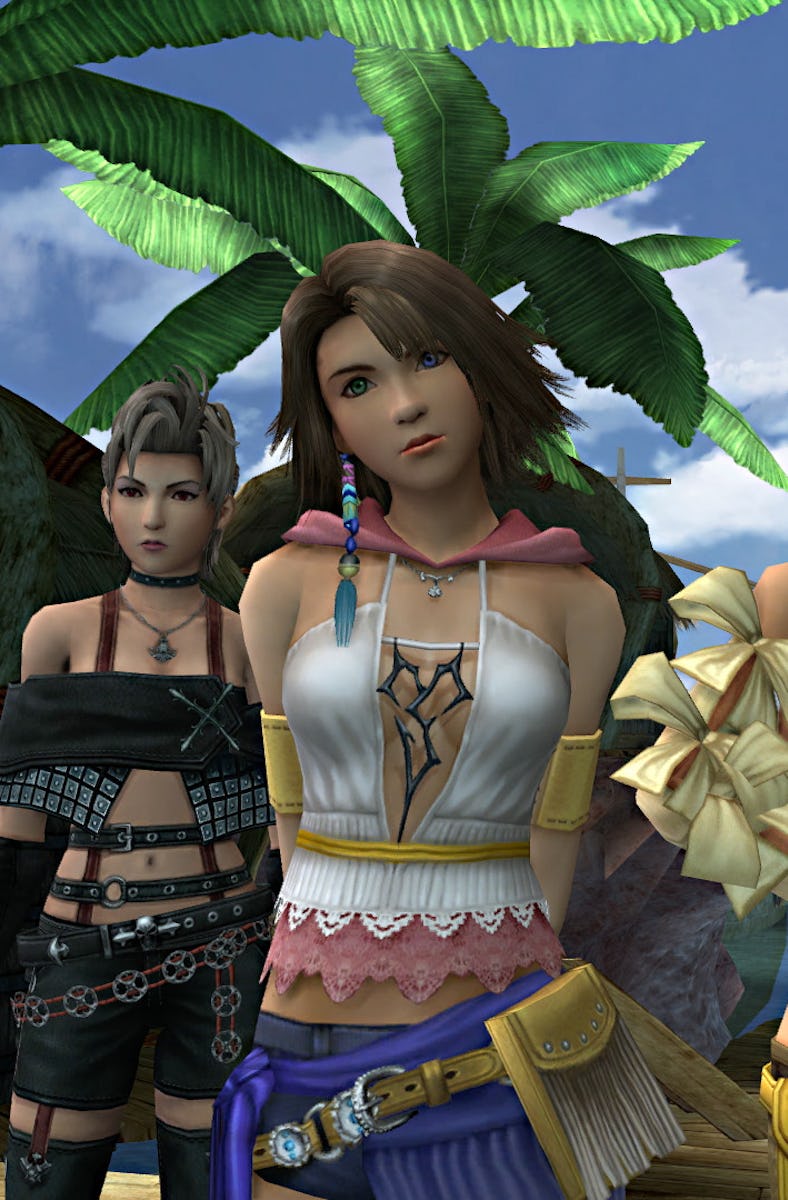The Most Controversial Final Fantasy Sequel Is Still Proving Its Haters Wrong
Dresspheres, or bust.

The high of playing Final Fantasy X when it was first released in 2001 can only be described as unparalleled. Over the years, the game has been ported to various devices, including Xbox One and Nintendo Switch, but the experience remains uniformly rewarding. Final Fantasy X marks an intriguing turning point in the Final Fantasy franchise. This was the first time the franchise opted for a predominant use of 3-D graphics instead of pre-rendered backdrops (the norm at the time) while rooting the story in the fantastical world of Spira, where our colorful cast of characters come together to defeat a gargantuan whale-beast named Sin.
The unanimous adoration for Final Fantasy X is in no way misplaced, but we’re not here to talk about Final Fantasy X. No, we’re here to talk about Final Fantasy X-2, the surprising sequel that defied expectations when Square Enix released this fascinating and baffling game in November of 2003.
At first glance, the core of Final Fantasy X-2 lies in the continuation of the tense socio-political conflicts in Spira, where the summoner Yuna searches for Tidus, our protagonist from the previous game. Yuna teams up with her pals Rikku and Paine (the trio being the sole playable characters, all women), who embark on a quest that takes a rather ugly turn, thanks to faction-based infighting and a new threat that aims to destroy the world as they know it. Considering such high narrative stakes, one would expect X-2 to maintain a somber aura throughout, more along the lines of the bleaker, darker vignettes of Final Fantasy: Type 0. However, the game ends up turning these expectations on its head right from its memorable opening scene, where Yuna belts out a pitch-perfect musical number for a packed audience like some J-pop idol.
This perfectly sets the stage for us to examine the overwhelming backlash the game received on release. Fans and critics were baffled by its peppy tone and unique combat system, while an undercurrent of misogynistic gamers decried Final Fantasy X-2’s central trio of female characters. Of course, the franchise had always featured powerful women — from Terra’s Esper in Final Fantasy VI to Lightning in Final Fantasy XIII — but this was the first time a story focused solely on a female trio, with events unraveling around them.
“Dresspheres” play a major role in Final Fantasy X-2.
Criticisms of the game mostly include unfavorable comparisons to a Charlie’s Angels-esque aesthetic. This extended to the fun, carefree tone imbued within the pop concerts that the girls participate in, along with a new outfit-transformation combat system that allows for versatility while switching jobs that grant buffs or boons. Moreover, some criticized the bubbly J-pop soundtrack that violently clashed with the serious, politically charged storyline, frequently undercut by lines of dialogue that seemed too flippant within the context of living in a world on the edge of change and destruction. However, this glossy artificiality, combined with unapologetic campiness, is the key to unlocking Final Fantasy X-2, and the treasures it keeps close to its heart.
To begin with, X-2 provides players with the option to experience its sprawling storyline as superficially or intimately as they want to, as its mandatory missions remain minimal, while the optional ones are brief and thoroughly enjoyable. As the girls road-trip their way through Spira, the player is granted an appropriate amount of choices to influence the state of the world, which act as branched decisions that feed into the sweeping primary narrative. As the player experiences the violent tussles firsthand and flits back to the fun, laidback shenanigans of the trio, one thing becomes painfully clear: escapism is the only way to nurture hope in such a brutal and unpredictable world.
This is the reason why there’s such a deliberate investment in excesses, especially in flashy displays of outfits that mostly aim to look impossibly cool, dubbed “dresspheres” (memory fragments with special skills and aesthetics that need to be slotted into garment grids). What initially seems vapid or silly is actually a pretty handy combat system that massively simplifies the convoluted combat style of Final Fantasy X — one that feels increasingly clunky with time. As dresspheres can be swapped out for each of the trio, this allows for varied party compositions, allowing more flexibility and making the job system incredibly fun to tweak and experiment with.
Some critics compared the tone of the game to Charlie’s Angels.
Despite the glitz and glamour, which some might be tempted to label as shallow, there’s an endearing brand of earnestness in Final Fantasy X-2. The game never takes itself too seriously and understands that its world’s history needs to be treated in accordance with the grasp of rampant capitalism over a restless populace, where monumental battlegrounds are turned into tourist attractions. Established characters like Yuna, Aurochs, and Isaaru undergo changes to match the absurdity of living in such a world, and while some of these character transitions aren’t the smoothest, they feel fresh and lighthearted enough when met with the same energy.
Final Fantasy X-2 is a breath of fresh air in a franchise that deliberately relishes in its self-importance (sometimes, to great effect, considering the beautifully complex storyline of the latest Final Fantasy XVI), celebrating the carefree transformation of three formidable women in a lawless universe. There’s much to love about X-2, from its upbeat soundscape to its stunning graphics, with its experience further enhanced by optional cinematic quests and minigames that add to the fun quotient. Whether you love it or love to hate it, Final Fantasy X-2 emerges as a road trip of a lifetime.
This article was originally published on